|
|
|
Sort Order |
|
|
|
Items / Page
|
|
|
|
|
|
|
| Srl | Item |
| 1 |
ID:
087564
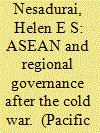

|
|
|
|
|
| Publication |
2009.
|
| Summary/Abstract |
This paper first reviews and critiques the dominant realist and constructivist accounts of ASEAN, which have enjoyed much prominence in The Pacific Review since the journal's founding in 1988. ASEAN behaviour and outcomes cannot be fitted into neat theoretical categories that emphasize either material or ideational variables in explanation. Instead, ASEAN displays complexities in behaviour that are the product of the contingent interaction between the material (power, territory, wealth) and the ideational (norms, ideas, identity) as member states actively seek to manage domestic order as well as regional order within and beyond ASEAN. In all of this, state interests and identities remain paramount, which means that the long-standing ASEAN norms of sovereignty/non-interference remain central to regional governance.
|
|
|
|
|
|
|
|
|
|
|
|
|
|
|
|
| 2 |
ID:
155097
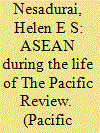

|
|
|
|
|
| Summary/Abstract |
Recent studies of ASEAN have focused on why ASEAN community building has emphasised liberal norms such as human rights, democracy promotion and a commitment to wider participation while maintaining a set of sovereignty-preserving regional principles – the ASEAN Way norms – that have been more suited to securing illiberal agendas and the authoritarian practices of state elites. ASEAN's seeming progressive turn is argued to be instrumentally aimed at buttressing the legitimacy of the grouping as a credible regional institution in international society in which these norms are widely accepted though not uncontested. With recent developments suggesting further consolidation of, or a return to, authoritarian tendencies across the region, state-based modes of governance may become more limited in terms of what ASEAN member states are prepared to endorse. It is, therefore, time for scholars to expand analysis to explore how transnational issues and problems may be functionally governed outside of formal regional institutions involving non-state actors in key roles. While the turn to privately generated standards, rules and practices in global governance is well-recognised and researched, the disparate studies on private governance in South-East Asia are rarely cumulated into a more coherent research programme that addresses the effectiveness of private governance as well as its normative implications. These questions point to a promising agenda for research on regional and other transnational modes of governance in South-East Asia.
|
|
|
|
|
|
|
|
|
|
|
|
|
|
|
|
| 3 |
ID:
058984
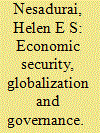

|
|
|
| 4 |
ID:
192157
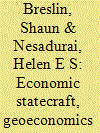

|
|
|
|
|
| Summary/Abstract |
In this introduction to the special issue, we establish the overarching objective for the collection; to investigate the salience and efficacy of conceptions of Economic Statecraft (ES) and Geoeconomics for understanding and explaining shifts in state-market relationships in a number of regional political economies. After a very short overview of different generations of ES research, we establish the set of common questions that each of the papers address, and how we arrived at them as the research project evolved. We point to the importance of ensuring that ES is not just thought of as something that the more powerful regional states engage in, and the need to adopt a three-part analytical distinction between different components of ES: motivations and objectives; actions and tools; and outcomes and consequences. This allows us to trace the relationship between goals and effects, provides a basis for comparative studies, and makes it easier to make a distinction between ES and other forms of state involvement in the economy.
|
|
|
|
|
|
|
|
|
|
|
|
|
|
|
|
| 5 |
ID:
125794
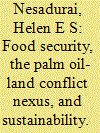

|
|
|
|
|
| Publication |
2013.
|
| Summary/Abstract |
This paper examines the nexus between food security and sustainability governance through a case study of palm oil. Palm oil's advocates claim that campaigns against palm oil and actions to halt its expansion due to sustainability concerns can undermine its food security role. However, palm oil expansion more directly undermines the food and livelihood security of rural and indigenous communities when land that rightfully belongs to, or has been used by, these communities is alienated to firms for oil palm cultivation with little or no consultation or compensation provided or alternatives considered. It is in this context that the paper examines whether the multi-stakeholder Roundtable on Sustainable Palm Oil (RSPO) is able to ensure that this commodity is cultivated in ways that minimise environmental damage and livelihood disruption, thereby safeguarding palm oil's contribution to food security. The findings are mixed. RSPO certification provides fairly comprehensive and progressive socio-environmental regulation that has enhanced sustainable production practises in this industry especially by the larger transnational plantation companies mindful of their global reputation. The RSPO is also far more responsive than governments have been to the land rights of rural and indigenous communities, providing due process for land claimants as well as recognising that these communities may have legitimate rights to land even if companies were awarded legal title by governments. However, multi-stakeholder regimes can be fragile, requiring a great deal of internal accommodation and trade-offs to work. Already, different interests in the RSPO are pulling in different directions while national certification systems have emerged that are less onerous compared to the RSPO even as the latter seeks to further enhance its sustainability credentials.
|
|
|
|
|
|
|
|
|
|
|
|
|
|
|
|
| 6 |
ID:
066809


|
|
|
|
|
| Publication |
London, Routledge, 2006.
|
| Description |
xx, 262p.
|
| Series |
Routledge/ Warwick studies in globalisation; No. 8
|
| Standard Number |
0415373506
|
|
|
|
|
|
|
|
|
|
|
|
Copies: C:1/I:0,R:0,Q:0
Circulation
| Accession# | Call# | Current Location | Status | Policy | Location |
| 050421 | 337.5/NES 050421 | Main | On Shelf | General | |
|
|
|
|
| 7 |
ID:
120206
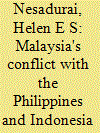

|
|
|
|
|
| Publication |
2013.
|
| Summary/Abstract |
If labour migration increases the potential for interstate conflicts, does the economic interdependence thus created make such conflicts easier to address, given the economic gains to both sides from such labour movements? This article addresses this question by using the concepts of economic security and interdependence to compare the Malaysia-Philippines and Malaysia-Indonesia conflicts over labour migration. Although the limited cases make generalizations difficult, the analysis suggests that the economic interdependence constraint on conflict escalation may not always work well as it may be offset by national security concerns in the labour receiving states about the illegal migrant workers and by the shifting economic underpinnings of economic security. The theoretically pacifying effect of interdependence can also be weakened by preventing the 'aggrieved country' from articulating clearer demands from the other side for fear of jeopardizing the economic gains from the migrant outflows. Comparing the two conflicts suggests that clearly articulated demands matched by effective state capacity in translating those demands into actions on the ground can help in conflict management. The potential for the migrant worker issue to evoke deep emotions and the ease with which that can translate into nationalist outpourings mean that both sending and receiving countries must develop bilateral or regional frameworks that outline clear best practice standards for the treatment of migrant workers, including during detention and repatriation.
|
|
|
|
|
|
|
|
|
|
|
|
|
|
|
|
|
|
|
|
|